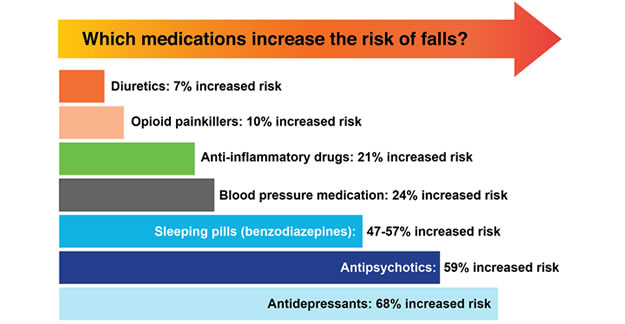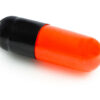Browse This Article
Certain medications can make you more likely to fall, which can cause injuries that sometimes require hospitalization.
Did you know?
- 1 in 5 people (20%) over the age of 65 living in the community report having a fall over the past year, with a higher prevalence among older seniors, i.e., over 80 years (Statistics Canada, 2010)
- For Canadian seniors, most hospitalizations from injuries are due to falls.
- Falls cause of 9% of all emergency room visits (CIHI 2011).
- When you take more medications, you are more likely to fall.
- Harmful effects of medications, such as concentration and balance problems, drowsiness, dizziness, or a drop in blood pressure, may increase the risk of falls.
Sources: de Jong et al. 2013 & Huang et al. 2012. (Although statistics are from Canada, the same data from the United States mirrors the Canadian data).

Interesting facts about hip fractures
- 95% of hip fractures occur during a fall (Huang et al. 2012).
- 20-30% of hip fracture patients die within one year of the fracture (Kong et al. 2012).
Do you have a friend or relative on medications that may increase their risk of falls? Click here to find brochures on the following topics:
- Anti-inflammatory medications such as ibuprofen or naproxen (Non-steroidal inflammatory drugs or NSAIDs)
- Sleeping pills / anti-anxiety medication (e.g. alprazolam/Xanax®, zolpidem/Ambien®)
- Antipsychotic medication (e.g. quetiapine/Seroquel®, risperidone/Risperdal®)
How Can I Reduce My Risk of Falls?
Strengthen your muscles: exercise to strengthen your muscles, especially your legs, and improve your balance. There are many programs or activities that will help you achieve this. The recommended exercise prescription to prevent falls is at least 30 minutes per day.
Optimize your eyesight: have your vision assessed regularly by an optometrist. Correct problems (myopia, presbyopia, cataracts, etc.) as needed. Cataract surgery can reduce the risk of falls by up to 37%.
Create a safe environment: limit carpets that slide easily over floors and over which you may slip and fall, remove furniture that obstructs passageways, use adequate lighting. A safe environment can reduce the risk of falls by up to 20%
Discontinue medications that may increase the risk of falls: cleaning out medications that cause falls can reduce the risk of falls by about 25%.
Do not stop any medication without talking to your doctor or pharmacist.
(Source: Ordre professionnel des physiothérapeutes du Québec).







